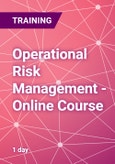Course description
This course will provide you with tools that will help you manage the operational risk of a financial institution effectively. You will learn how to build an internal and external database, how to perform scenario analysis, and how to find Key Risk Indicators and make Risk Control Self-Assessment. You will also learn how to assess the capital requirements for banks and insurance companies.
How is the online course conducted?
Great emphasis is placed on interaction. Therefore, the training will be a combination of recorded training, exercises, and guidance. The course includes:
- A recorded classroom training without participants, where you will get exercises and solutions as part of the training.
- Possibility to ask questions and get answers within 24 hours.
- Two months access to the course. You decide when and at what pace you want to follow the recorded training.
- A training that is suitable for viewing on both computer and mobile.
You must set aside approx. 1 working day for the course.
Course content
- Framework for Operational Risk Management
- Key Risk Indicators
- Heat Maps
- Operational Risk Self Assessment (ORSA)
- Building a Loss Database
- Using External Data
- Mitigation of Risk
- Capital Requirements for Operational Risk (Basic Indicator, Standard Method and AMA)
Prerequisites
- The course requires no specific prior knowledge apart from a general understanding of financial institutions.
Course Content
Chapter 1 - Introduction to Operational Risk Management (ORM)- Defining operational risk
- Objectives of Operational Risk Management
- Types of events and lines of businesses
- Recommendations from the Basel Committee
- Reputational risk and operational risk
- Operational risk in banks and mortgage institutions
- Operational risk in insurance companies
- Examples of operational risk losses
- The Framework for Operational Risk Management
- Identifying Risks
- Heat Map
- Risk Control Self-Assessments (RCSA)
- Scenario Analysis
- Internal Loss Databases
- External Loss Databases
- Integrating External and Internal Events
- Mitigation of Risk
- Loss Prediction and Prevention
- Key Risk Indicators
- Why are KRI essential?
- How to make KRI operational?
- What is included in the regulatory framework?
- The Basic Indicator-model
- The Standard Model
- The Advanced Measurement Approach
- Solvency II and operational risk
- Exercise - Calculating Capital Requirements using different approaches
- Reporting
Who Should Attend
- Risk Managers
- Internal Auditors
- Accountants
- Backoffice Employees
- Controllers
- Managers
- Compliance
- Regulators
- Account Managers








